October 15, 2024 | 09:16 GMT +7
October 15, 2024 | 09:16 GMT +7
Hotline: 0913.378.918
October 15, 2024 | 09:16 GMT +7
Hotline: 0913.378.918
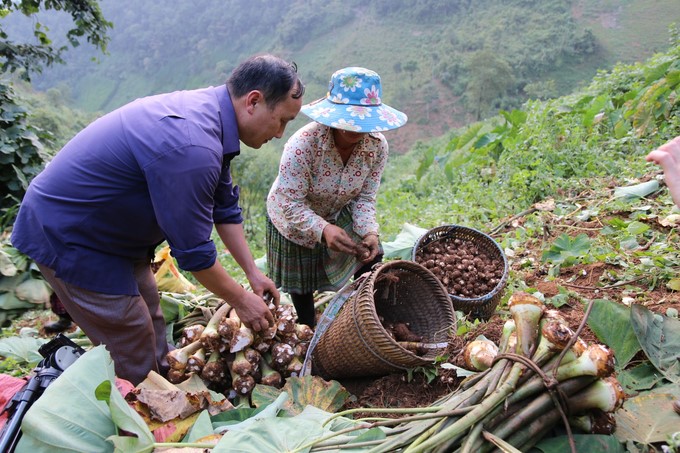
The area of upland taro farming is increasingly expanding in Tram Tau district, Yen Bai province. Photo: Thanh Tien.
Taro (scientific name: Colocasia esculenta) belongs to the family Araceae. The stem is divided into two parts, of which the main stem (root) swells into tubers, consisting of a main tuber and many baby tubers growing around it. In addition to high fiber and starch content, taro also contains many healthy nutrients such as protein, fat, calcium, iron, manganese, vitamin C, vitamin E, etc.
According to Mr. Nguyen Anh Tuan, Head of the Tram Tau Department of Agriculture and Rural Development, the locality's taro tree is an indigenous variety, grown by people mainly on rocky mountain slopes with a temperate climate. The soil in the mountains and forests here has a lot of humus and minerals, so taro tubers are especially delicious.
People in localities in the district often plant taro from mid-March every year when the weather in Tram Tau has a lot of rain and the soil on the hills is wet. After about 6 months of care, the harvest crop takes place from the end of September to the end of November, when the rainy season has ended.
When the taro leaves turn yellow and dry, the tuber is mature, has a high starch content, has a delicious flavor, and can be harvested. The taro tuber is round, thin-skinned, white inside, and outside still has the black humus layer of upland fields. Tram Tau upland taro is small, soft, fragrant, rich in flavor, has high nutritional content, and can be used to boil, cook soup, make cakes, etc.
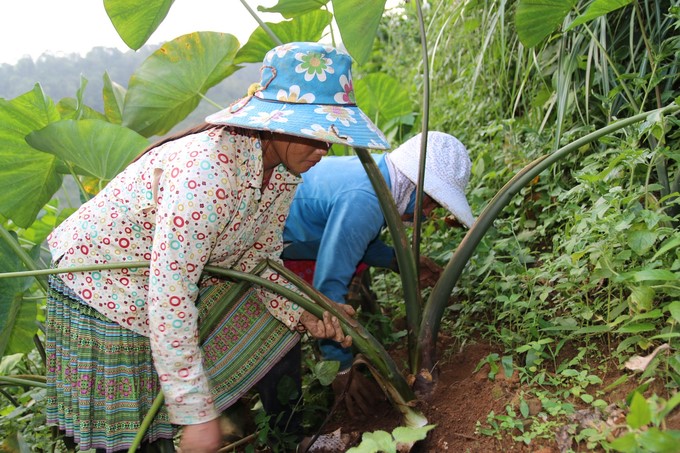
With specific climate and soil characteristics, taro in Tram Tau has delicious quality and is favored by many people. Photo: Thanh Tien.
Previously, the Mong people in Tram Tau grew taro for self-sufficiency, mainly using it as food for people and livestock, not for business, so the economic efficiency was low. In recent years, realizing the commodity value of taro, the district has determined to develop staple products associated with brand building and trademark protection and gradually create product consumption linkages.
Taro was chosen as one of the locality's typical products. Since 2019, Tram Tau district has begun to mobilize people to grow taro into a concentrated commodity area, with an initial area of 45 hectares in Xa Ho, Ban Cong, Ban Mu, Pa Hu, and Pa Lau communes.
In 2021, the district has implemented a project to build a taro production linkage model with the policy of promoting taro growing on upland fields, converting hilly land areas with low economic efficiency to taro growing in order to gradually promote the advantages of local staple crops.
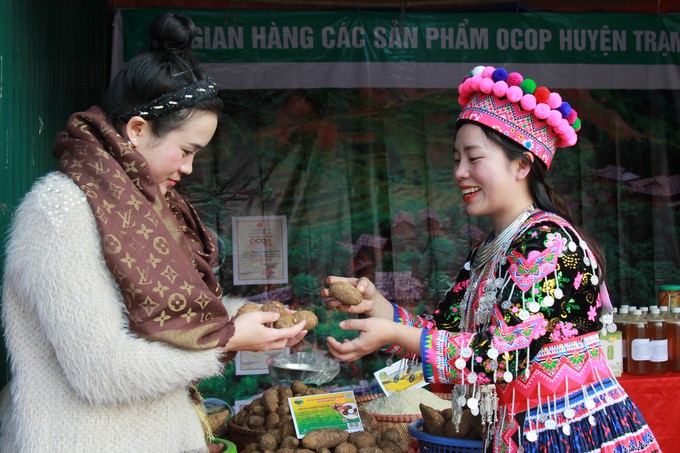
Taro output in 2024 of the entire Tram Tau district is estimated to reach more than 11,000 tons. Photo: Thanh Tien.
Since then, every year localities have supported and guided people to expand their area. The whole district had about 600 hectares of taro growing by 2023 and increased to about 800 hectares in 2024. Currently in the middle of the harvest crop, according to forecasts, this year the Mong people in the district will have a good taro crop with an average productivity of 14 tons/ha, an estimated output of more than 11,000 tons, worth over VND 200 billion.
Mr. Nguyen Thanh Hung, Vice Chairman of the Tram Tau District People's Committee, said that, refined from the essence of heaven and earth along with the potato-growing culture of the Mong people in the Northwest, Tram Tau taro has become a specialty in this high mountain area.
Tram Tau upland taro has been granted a trademark registration certificate by the Intellectual Property Office. Along with that, the district also focuses on building a document system for management, use, and quality control of taro products from planting, care, harvesting, and product preservation.
With a stable productivity of 14 tons/ha, excluding production costs, taro brings farmers over VND 120 million/ha, creating a high source of income and helping many households escape poverty.
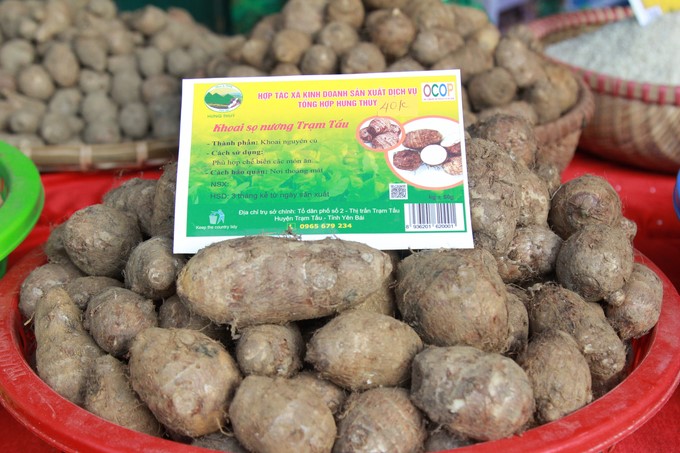
Tram Tau district is continuing to support people in improving the quality of taro to upgrade OCOP products. Photo: Thanh Tien.
To increase income from taro, Tram Tau district has directed the district's agricultural sector to coordinate with communes to mobilize people to harvest taro at the right age and choose sunny days for harvesting. During the harvesting process, mobilize people to pre-process, pick roots, clean the soil, and classify quality and uniform tubers for sale, thereby building a brand for the product.
In addition, the district government continues to focus on promoting and bringing Tram Tau upland taro into large supermarkets and e-commerce platforms. The product is currently present at major supermarkets in Hanoi, Vinh Phuc, Ho Chi Minh City, Lam Dong, etc.
Local functional sectors are also continuing to support people in improving product quality, building consumption chains, designing packaging and models, pre-processing, and preserving to upgrade products to reach 4-star and 5-star OCOP, aiming for exports to increase value per unit area.
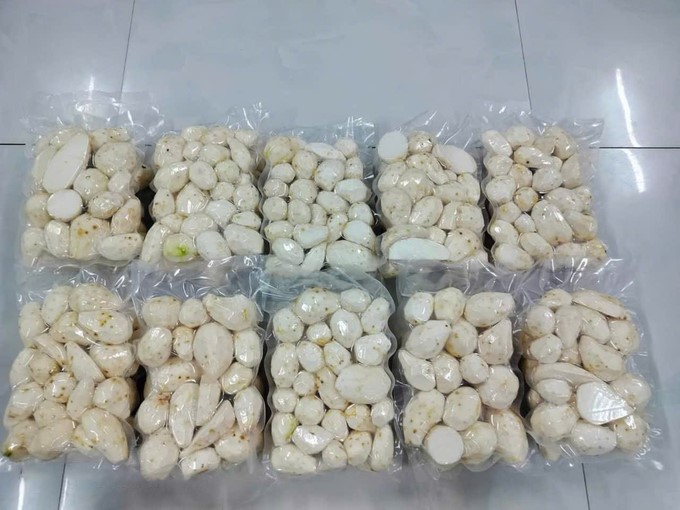
The pre-processing and preservation of taro products contributes to increasing income for people. Photo: Thanh Tien.
Recently, the district's agricultural sector coordinated with Sendo Farm to organize a livestream to introduce Tram Tau upland taro at the taro field of Mr. Cho A Lu's family (Sang Pao village, Xa Ho commune).
Ms. Luong Thi Thien Huong, manager of Sendo Farm's purchasing department, said that with the aim of helping Mong people in Tram Tau bring upland taro products to consumers nationwide, in just over 1 hour of livestream, customers ordered more than 5 tons of taro at high prices. After the livestream, the unit is expected to consume about 10 tons more.
Through the livestream, customers can directly see people's taro fields and harvesting methods. In which taro field the product is livestreamed, the unit will pick up the goods from that field to deliver to customers, ensuring the right quality and requirements and keeping credibility. This is also the fastest solution to help people bring their products to buyers nationwide through digital technology, contributing to solving the situation of "good season, bad price."
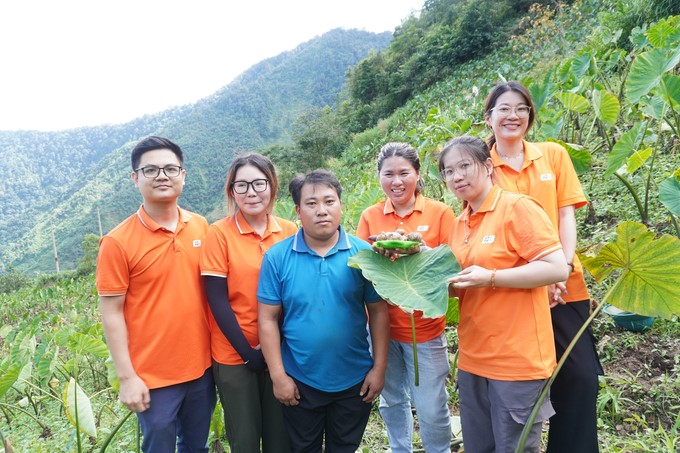
Sendo Farm organized a livestream to introduce products at the taro field of Mr. Cho A Lu's family. Photo: Thanh Tien.
Mr. Cho A Lu in Sang Pao village (Xa Ho commune), with half a hectare of taro growing converted from corn fields, excitedly said, "Previously, my family transported taro by motorcycle to the market to sell; prices were unstable. Nowadays, consuming products is more convenient, and traders come to the fields to buy.
In this crop, with the help of Sendo Farm to sell products via smartphones, people are very happy and no longer worry about the selling price. This will be an effective product consumption channel. From now on, we will only worry about planting and expanding the area."
With an output of tens of thousands of tons, Tram Tau district is continuing to implement many solutions to consume taro for people. In particular, selling on social networks and e-commerce sites is one of the important solutions. Through this form, the product is promoted to a large number of customers, contributing to enhancing product value.
Translated by Thu Huyen
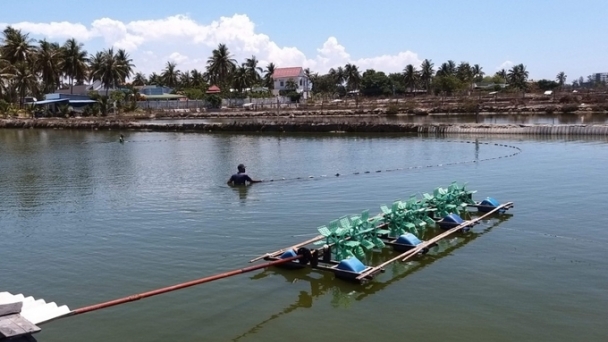
(VAN) The application of technical advancements is key to enhancing productivity and quality as well as reducing production costs and environmental pollution.
/2024/10/12/0332-2-015501_750.jpg)
(VAN) With organic durian growing, the rate of type A fruits can reach 70–80%, bringing long-term benefits to farmers and society.
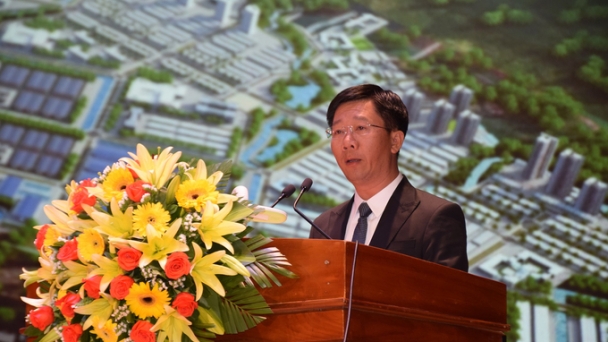
(VAN) Investment attraction linkage is the central issue at the investment promotion conference for the Central Coastal provinces, held in Binh Dinh on October 10th.
/2024/10/11/0612-3-005836_875.jpg)
(VAN) Recently, we had the opportunity to visit a large-scale cordyceps production farm in Ben Luc district, Long An province, owned by Mr. Le Xuan Dieu.
/2024/10/10/4114-2-162836_736.jpg)
(VAN) Tourism businesses in Binh Dai district, Ben Tre province, went to Thailand to study to do community tourism and have initially applied it in operations, bringing significant progress.
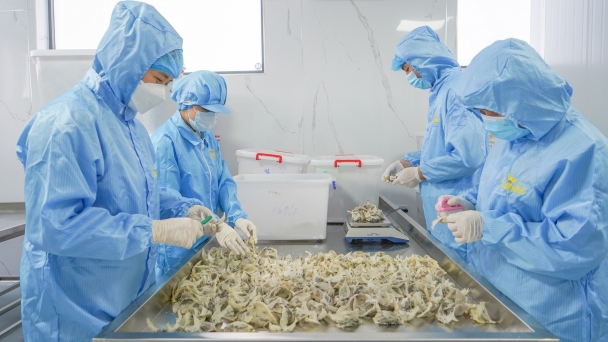
(VAN) Focusing on solutions to enhance the quality and added value of bird's nest products, while also complying with the regulations of the export protocol for official trade to China.